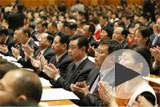Communists walk fine line in reform
(Xinhua)
Updated: 2012-11-09 19:57
BEIJING - A Chinese saying goes that an element resulting in success may also trigger a failure.
The reform and opening up campaign, which has brought the Communist Party of China (CPC) tremendous achievements in the past three decades, is now more of a conundrum testing the Party's courage and wisdom.
With many Chinese feeling increasingly exposed to social ills in their daily life, including inferior food, fake drugs, workplace accidents, official corruption, environmental deterioration, yawning wealth gap, and inequitable public services and demoralization, the country's double-digit growth record is no longer being hailed as a pure achievement.
Some blame the fervent pursuit of rapid growth for increasing social problems, or even call for a focus shift from economic expansion to better social management.
At the Party's ongoing national congress, President Hu Jintao expounded on the country's strategic decision to follow the fundamental guideline of pursuing development in a scientific way and fulfilling the essential task of growth pattern transformation through constant reforms.
The Party's major considerations are that China is and will continue to be a developing country and that the failure to meet the ever-growing material and cultural needs of the people remains a principal problem to be tackled.
Such realities mean that China cannot count on overnight reforms to sort itself out. Nor can it afford to become complacent or slack in further reforms.
Over the past decades, the CPC has learned from the experiences of others that poor grades in economic governance can jeopardize the legitimacy of a ruling party. On the other hand, economic achievements alone cannot guarantee a long-standing reign.
To press ahead with reforms, the Party must tread a fine line between the twin targets of securing sustainable economic growth and upholding social justice.
Sluggish external demand, the global financial crisis and increasingly heated trade frictions, together with arduous economic restructuring at home, are expected to slow down China's economic expansion.
Social justice cannot be maintained without solid fiscal strength, as the government must expand fiscal input to narrow disparities between regions and population groups, and ensure equal access to public services, especially health care, education and social security.
The CPC must also figure out the proper timing and intensity for reforms in significant spheres and inspire public pride and confidence in national rejuvenation.
According to the Party's political report delivered by Hu at the Party congress Thursday morning, Chinese officials will be thrusted to the forefront to spearhead future reforms.
They must optimize fiscal and taxation systems to ensure that central and local governments have sufficient financial resources to exercise their respective powers, fulfill their respective responsibilities and allow the invisible hand to play a role.
To allow private economies to fairly compete with state-owned enterprises, the government must also contain state-owned enterprises operating in fields that are not vital to national security or the lifeline of the economy, and eliminate the interference of departmental interests in policymaking.
In terms of expanding democracy, it is important to subject the government's power to tightened oversight by the legislature and enhance intra-Party democracy and public oversight in order to check the power of the Party.
In response to public outcry over inequity, China has issued a white paper on judical reforms. Arrangements to stop forced confessions gained through torture, protect the rights of lawyers and expand legal aid to the needy have raised broad attention and new expectations.
Upon its founding in 1921, the CPC gathered public trust and support in a time of chaos by promising to turn China into a classless, prosperous society.
Sixty-three years after coming to power, the Party is encountering new challenges in an ever-changing world. For average Chinese, the appeal of taking a socialist path will grow, provided that the Party can make decisions impartially for the good of the masses at every crucial stage.
Related Stories
Wen pinpoints key tasks facing China in 5 years 2012-11-09 17:03
Wenzhou to reveal details of financial reform 2012-11-09 15:22
No Western system in China's political reform 2012-11-09 09:12
Changes in growth model a priority 2012-11-09 08:31
Chongqing committed to reform 2012-11-09 08:03
Changes in growth model a priority 2012-11-09 02:03
Vice Premier urges deepening reform 2012-11-08 23:58
China to continue political structure reform 2012-11-08 10:14
Book preferences hint at China's will for mild reform 2012-11-08 14:30
Video







